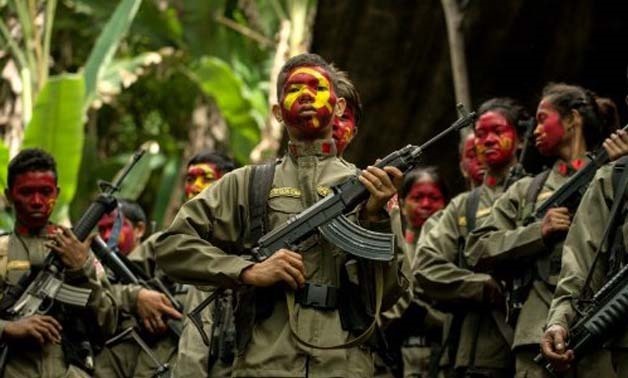
© AFP / by Cecil MORELLA | Fuelled by one of the world's starkest rich-poor divides, a Maoist rebellion in the Philippines that began months before the first human landed on the moon plods on even though the country now boasts one of the world's fastest-g
MANILA - 17 August 2017: At least 26 people died overnight in police operations in the Philippines capital Manila, authorities said on Thursday, a second night of heavy bloodshed this week in an intensification of President Rodrigo Duterte's fierce war on drugs and crime.
The killings across Manila followed 32 deaths in police raids on Monday night in Bulacan province, which borders the capital. Together, they mark the deadliest period of a drugs-focused crackdown that has killed thousands of Filipinos, and caused international alarm, since Duterte took office over a year ago.
Colonel Erwin Margarejo, spokesman for Manila police, described the raids that started late Wednesday in Manila as "one-time, big-time" operations, the same term used by police in Bulacan, who said the victims died because they chose to put up a fight.
The term has been used by Philippines police to describe a coordinated anti-crime drive in crime-prone districts, usually slums or low-income neighbourhoods, often with additional police deployed.
It was however not immediately clear what was behind the step-up in the number of coordinated police operations this week.
According to police reports, a total of 179 people were arrested in Manila and Bulacan. The reports said police launched 84 operations in the two regions, the majority of which were "buy-bust" stings, in which plain-clothes officers attempt to trap drug peddlers.
"This is 'one-time, big-time' operations, so it is not focused only on drugs, we are operating also against other street crimes, like robbery, but these people could also be under the influence of drugs," Margarejo said.
"If they resisted violently, our police have to defend themselves."
Duterte unleashed his crackdown the day he took office on June 30 last year after a convincing win in an election in which he campaigned heavily on a promise to use deadly force to wipe out crime and drugs.
On Wednesday, he indicated the latest operations had his blessing.
Duterte said it was good that 32 criminals had been killed in Bulacan, then added: "Let's kill another 32 every day. Maybe we can reduce what ails this country."
Manila police chief Oscar Albayalde said there had been no instruction to change or increase the scale and scope of the anti-drugs campaign.
"This is just part of our 'one-time, big-time' operations against illegal drugs," he told Reuters.
'GRAVE DANGER'
Duterte also chided human rights groups on Wednesday for getting in the way of his anti-drugs campaign and said police should shoot them if they obstructed justice, a remark the New York-based Human Rights Watch said puts activists "in grave danger".
Its deputy Asia director, Phelim Kine, described the comments as "like painting a target on the backs of courageous people working to protect the rights and upholding the dignity of all Filipinos."
The exact number of people killed during the war on drugs is difficult to quantify, with no independent statistics available and police providing comprehensive data only for deaths during anti-drugs operations, where official accounts typically say suspects resisted arrest.
From the start of the drugs war to the end of July, police said over 3,400 people were killed in their operations. Police said about 2,100 deaths among some 13,500 murders over the same period were drugs-related, attributed to turf wars, informants being silenced, or vigilantes killing drug users.
A total of 65 policemen have been killed on the job during this time.
Critics maintain that members of the Philippine National Police (PNP) are executing suspects and say it is likely they have a hand in thousands of unsolved murders of drug users by mysterious vigilantes. The PNP and government reject that.
Although the violence has been criticised by much of the international community, Filipinos largely support the campaign and domestic opposition to it has been muted.
Several Senate hearings into allegations that Duterte operated a death squad when he was a city mayor and was now using the same approach on a national scale have been inconclusive, while an impeachment complaint filed earlier this year was dismissed by Congress.
National police chief Ronald dela Rosa told reporters there would be no let-up in the war on drugs.
"This is unrelenting, we will continue to operate until the end," he said.


Comments
Leave a Comment